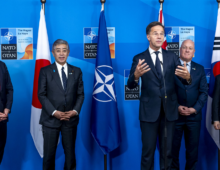China’s export curbs deepen Seoul’s dilemma between securing supply chains and staying aligned with Washington
South Korea said on Wednesday it has enough strategic reserves and domestic production capacity to weather China’s new export controls on tungsten and four other minerals, at least in the short term. The trade ministry said it holds about six months’ worth of tungsten stockpiles and over three months of molybdenum supplies, though it acknowledged heavy reliance on Chinese imports with dependency rates of 85% and 90% respectively. While reserves offer a short-term buffer, a prolonged restriction could disrupt supply chains and drive up costs for firms like Samsung Electronics and SK Hynix.
The export control measures, announced by Beijing on Tuesday in response to U.S. tariffs, require Chinese exporters to obtain permits for shipping tungsten, molybdenum, germanium, bismuth and tellurium products — key materials used in semiconductors and displays. While South Korea’s trade ministry stressed the controls don’t amount to an outright ban, it said it would closely monitor supply chains and work to diversify import sources, noting that for some materials like indium, South Korea is already the world’s second-largest producer after China.
South Korea said on Wednesday it has enough strategic reserves and domestic production capacity to weather China’s new export controls on tungsten and four other minerals, at least in the short term. The trade ministry said it holds about six months’ worth of tungsten stockpiles and over three months of molybdenum supplies, though it acknowledged heavy reliance on Chinese imports with dependency rates of 85% and 90% respectively. While reserves offer a short-term buffer, a prolonged restriction could disrupt supply chains and drive up costs for firms like Samsung Electronics and SK Hynix.
The export control measures, announced by Beijing on Tuesday in response to U.S. tariffs, require Chinese exporters to obtain permits for shipping tungsten, molybdenum, germanium, bismuth and tellurium products — key materials used in semiconductors and displays. While South Korea’s trade ministry stressed the controls don’t amount to an outright ban, it said it would closely monitor supply chains and work to diversify import sources, noting that for some materials like indium, South Korea is already the world’s second-largest producer after China.
Get your
KoreaPro
subscription today!
Unlock article access by becoming a KOREA PRO member today!
Unlock your access
to all our features.
Standard Annual plan includes:
-
Receive full archive access, full suite of newsletter products
-
Month in Review via email and the KOREA PRO website
-
Exclusive invites and priority access to member events
-
One year of access to NK News and NK News podcast
There are three plans available:
Lite, Standard and
Premium.
Explore which would be
the best one for you.
Explore membership options
© Korea Risk Group. All rights reserved.
No part of this content may be reproduced, distributed, or used for
commercial purposes without prior written permission from Korea Risk
Group.












